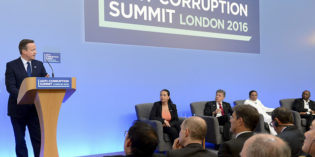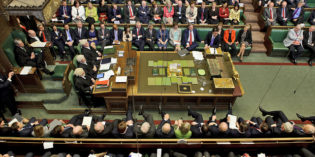Achieving accountable government

The long and winding road to fiscal adjustment: How the IMF judges austerity programmes
IMF judgements on whether government austerity programmes can be successfully implemented are carefully followed by international financial markets. Markus Hinterleitner, Fritz Sager and Eva Thomann analyse the way the organisation has judged the credibility of austerity programmes in 14 European countries. They find that the IMF considers implementation credibility in its evaluations of austerity programs, […]

The Decline of Policy Mandates in Australia
Ruling parties often make reference to having a ‘mandate from the people’ for their actions, but refrain from mentioning this concept while in opposition. Ross Stitt analyses data showing that less and less Australian voters are participating in primary elections. As the primary vote of incoming governments declines, so too does the level of any potential policy […]

The Scottish Parliament would be as powerless in an independent Scotland as it is now
In spite of the ‘power sharing’ idea inherent in Scotland’s devolution settlement, concerns have been repeatedly raised about how power is wielded in the Scottish Parliament. These deficiencies have so far not been addressed in a convincing manner. Paul Cairney examines the use of Parliamentary Liaison Officers (PLOs), pointing out that such practices undermine the existence of any meaningful dividing […]

Beyond metro mayors and ‘secret deals’: rethinking devolution in England
As the guard changes in Westminster and new government seeks to differentiate itself from its predecessor, it is timely to review the state of the devolution debate, argues John Tomaney. Policymakers need to learn from the US experience and reconsider the fixation on mayors. Just as importantly, the problem with ‘secret deals’ must be addressed if devolution is going to […]

Thanks to the referendum, the tyranny of the majority has prevailed
Many people living in the UK, and some Britons outside it, had no vote in the referendum. Scotland and Northern Ireland chose to Remain but will be forced to leave. Arash Heydarian Pashakhanlou argues the UK has succumbed to the tyranny of the majority thanks to the decision to put EU membership to a referendum. […]

Book Review: Power Shift: On the New Global Order by Richard Falk
In Power Shift: On the New Global Order, Richard Falk examines the challenges and changes to global politics since the end of the Cold War, covering issues including the rise of drone warfare, climate change and the growing significance of non-state actors. He focuses particularly on the key role that US militarism has played in […]

Is there a future for referendums?
The EU referendum has led to doubts about referendums as an instrument of public policy. Albert Weale suggests that the good conduct of referendums depends on the question being clear and voters having easy access to the relevant evidence. The EU referendum failed both of these tests. Future referendums should be on well-defined questions and steps should […]

Anti-corruption after Brexit: What is left of David Cameron’s legacy?
David Cameron’s government frequently emphasised the need to tackle corruption, both within the UK and abroad. Daniel Hough assesses how this picture is likely to change following Britain’s decision to leave the EU and the appointment of Theresa May as Prime Minister. He writes that with Brexit posing a number of challenges for May’s government, […]

‘Post-truth’ politics are a debasement of standards in public life
Verbal dexterity, inconsistency and ‘spin’ are part and parcel of normal politics but the exaggerations and distortions of the EU referendum campaign has led to concerns about ‘post-truth’ politics. Nicholas Allen and Sarah Birch write there is a need for someone to provide a moral lead, and argue the Committee for Standards in Public Life […]

Should we just leave the selection of the party leader to MPs?
From 1922-1980, Labour leaders were elected by MPs in a secret ballot. While there are superficially attractive reasons for the increased trend towards democratising party leadership elections, Richard Johnson questions whether it has really given us better value and proposes that we should reconsider the merits of leaving party leadership selection to Labour MPs. More […]


 Democratic Audit's core funding is provided by the Joseph Rowntree Charitable Trust. Additional funding is provided by the London School of Economics.
Democratic Audit's core funding is provided by the Joseph Rowntree Charitable Trust. Additional funding is provided by the London School of Economics.